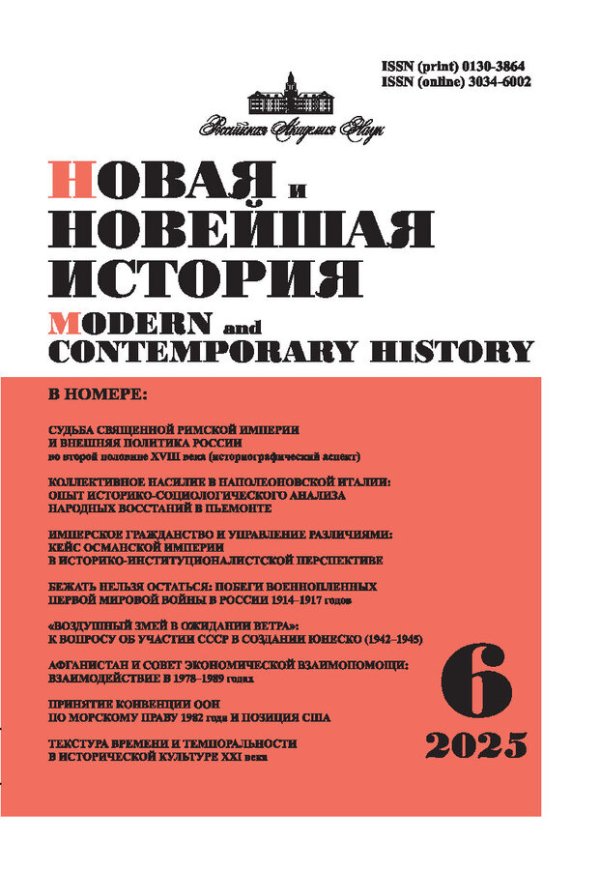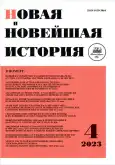The Origins of American Indians in the European Historical Thought of the Sixteenth Century
- Authors: Krivushin I.V.1
-
Affiliations:
- National Research University “Higher School of Economicsˮ
- Issue: No 4 (2023)
- Pages: 60-71
- Section: The age of discoveries and renaissance culture
- URL: https://journal-vniispk.ru/0130-3864/article/view/140871
- DOI: https://doi.org/10.31857/S013038640025122-2
- ID: 140871
Cite item
Full Text
Abstract
The aim of the article is to identify the main features of the approach of historical thought of the sixteenth century, first and foremost that of Spain, to the question of the origin of the indigenous peoples of the Americas. In general, this problem remains poorly studied in recent historiography (with the exception of the works of Lee Huddleston and Vladimir Acosta), although it is associated with one of the most important aspects of European understanding of the reality of the New World, not yet known to them, whether it be ethnic, spatial, historical. The main task of the author is to try to explain the fact that the study of the origin of the Indians, despite the abundance of various theories (Phoenician, Carthaginian, Hebrew, Ophirian, etc.), remained on the periphery of interest of European writers and thinkers throughout the sixteenth century. To answer this question, the author analyses the writings of some Renaissance writers (Fernando Colón, Cabello Balboa, José de Acosta, Gregorio García) who addressed this issue in order to identify the methods and ways of argumentation that they used in this case. The most popular of them, as shown in the article, were the analysis of the content of historical sources based on common sense, and the method of cultural and anthropological comparison of present inhabitants of the New World with ancient and modern peoples of the Old One. The article concludes that the European historical thought of the Renaissance eventually recognized its inability to answer the question of the origin of the Indians due to the extreme scarcity of historical data at its disposal and the irrelevance of the tools of historical analysis that it had.
About the authors
Ivan Vladimirovich Krivushin
National Research University “Higher School of EconomicsˮRussian Federation, Moscow
References
- Гуаман Пома де Айяла Ф. Первая новая хроника и доброе правление (доколумбовый период) / пер. В.А. Кузьмищева. М., 2011.
- Юрчик Е.Э. «Черная легенда» в испанской просветительской литературе // Электронный научно-образовательный журнал «История». 2011. Т. 2. № 8. URL: https://history.jes.su/s207987840000246-9-1/?sl-ru (дата обращения: 02.02.2023).
- [Petrus Martyr]. De orbe novo Decades. [Alcalá de Henares, 1516].
- Acosta J. de. Historia natural y moral de las Indias. Sevilla, 1590.
- Acosta V. El continente prodigioso. Mitos e imaginario medieval en la Conquista americana. Caracas, 1998.
- Alexo Vanegas. Primera parte de las diferencias de libros q[ue] ay en el universo. Toledo, 1540.
- Allen B.M. Naked and Alone in a Strange New World: Early Modern Captivity and its Mythos: DPh Thesis. Austin (TX): University of Texas, 2008.
- Arnoldsson S. La leyenda negra: estudios sobre sus orígenes. Göteborg, 1960.
- Benzoni G. La historia del Mondo Nuovo. Venetia, 1565.
- Berkhofer R.F. The White Man's Indian: Images of the American Indian from Columbus to the Present. New York, 1978.
- Bustos Rodríguez M. De dónde llegaron los indios? El poblamiento de América según el oidor Diego Andrés Rocha // Naturalia, mirabilia y monstrosa en los imperios ibéricos (siglos XV–XIX) / eds E. Stols, W. Thomas, J. Verberckmoes. Leuven, 2006. P. 59–78.
- Cabello Balboa M. Obras. Vol. 1. Quito, 1945.
- Carbia R.D. Historia de la leyenda negra hispano-americana. Madrid, 2004.
- Colección de bulas, breves y otros documentos relativos a la iglesia de America y Filipinas. T. 1. Bruselas, 1879.
- Colón F. Historia del almirante don Cristóbal Colón. T. 1. Madrid, 1932.
- Dougherty M.W. Lost Tribes Found: Israelite Indians and Religious Nationalism in Early America. Norman (OK), 2021.
- Fernández de Oviedo y Valdés G. Historia general y natural de las Indias, islas y Tierra-Firme del mar océano. Pt. 1. Madrid, 1851.
- García G. Origen de los Indios de el Nuevo Mundo, e Indias Occidentales. Valencia, 1607.
- Godbey A.H. The Lost Tribes – a Myth: Suggestions towards Rewriting Hebrew History. Durham (NC), 1930.
- Huddleston L.E. Origins of the American Indians: European Concepts, 1492–1729. Austin (TX), 1967.
- Io[annis] Bodini Andeg[avensis] in Parisiorum senatu advocati Methodus ad facilem historiarum cognitionem. Parisius, 1572.
- Kupperman K.O. The Atlantic in World History. Oxford, 2012.
- Martínez Terán T. Gregorio García, O. P., 1554?–1630: l'idéologie coloniale et l'origine des Indiens: Thèse de doctorat. Paris: Université Paris III, 1999.
- Martínez Terán T. Los antípodas: el Origen de los indios en la razón política. Puebla, 2001.
- Smith J.Z. Relating Religion: Essays in the Study of Religion Chicago; London, 2004.
- Snipp C.M. American Indians: The First of This Land. New York, 1989.
- Theophilus Cremonensis. Propositiones ex ómnibus Aristotelis libris exceptae. Venetia, 1493.
- Todorov T. La conquête de l'Amérique: La question de l'autre. Paris, 1982.
- Valenzuela Matus С. Los antiguos en el Nuevo Mundo. Reflexiones de los jesuitas José de Acosta y Alonso de Ovalle sobre el origen de los nativos americanos, siglos XVI–XVII // Revista de Historia y Geografía. 2017. № 37. P. 21–36.
- Wauchope R. Lost Tribes & Sunken Continents: Myth and Method in the Study of American Indians. Chicago; London, 1962.
Supplementary files










